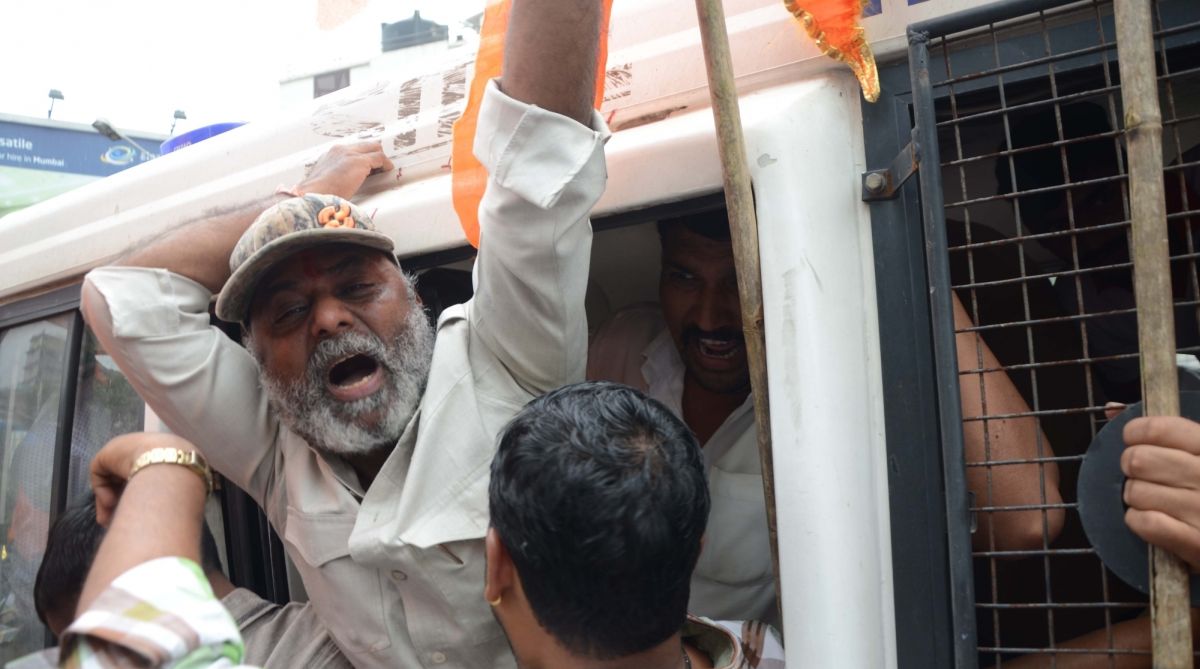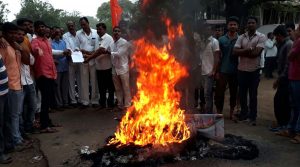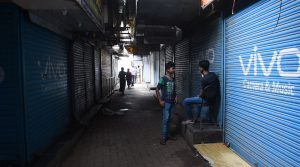Maharashtra Speaker orders SIT probe over Maratha quota activist’s allegations against Devendra Fadnavis
Patil had accused Fadnavis of hatching a conspiracy to kill him.
The latest phase of the Maratha protests have seen at least three deaths and a number of suicide attempts. Instead of reservation, the community now seeks OBC status and wants the Maharashtra government to decisively act on their demand

Maratha activists staging a demonstration in Mumbai on July 25, 2018. (Photo: IANS)
In 2016, when the Maratha community took to the streets across Maharashtra for the first time to demand for quota in jobs, and during the subsequent rallies, the “leaderless” protest marches would be marked by a unique factor. Despite the huge show of strength, with a large number of people joining the rallies, the Maratha agitation remained largely peaceful. The latest phase of the protest by the community has, however, taken a violent form.
Marathas form 33 per cent of the state’s population, and they want the government to now decisively act on their demands. The silent marches under the Maratha Kranti Morcha have hence turned aggressive now, with the community asserting its strength.
The protests have already seen at least three deaths and a number of suicide attempts.
Advertisement
While one of the protesters, Kalasaheb Shinde (27), took “jal samadhi” in Godavari river in Aurangabad on Monday, Jagannath Sonawane (45), who had consumed poison on Tuesday, died in a hospital in Aurangabad on Wednesday.

As the protests took a violet turn following Shinde’s death, a head constable from Osmanabad, Shyam Kadgaonkar (50), died on duty at Kaigaon-Toka on the Aurangabad-Pune highway on Tuesday.
On Wednesday, the second phase of the Maharashtra shutdown call by Maratha groups, witnessed sporadic violence across the state, before it was called off around 3 pm.
The Anti-Fadnavis turn
For the last few days, Maharashtra has seen torching of buses and tyres, and road blockades in several parts, mainly in Marathwada, western Maharashtra and Konkan areas. There have been sit-ins by Maratha Kranti Morcha members in Beed and Nashik districts.
The immediate trigger for their protest, according to Maratha leaders, is the announcement Fadnavis made in the state Assembly on 20 July. The CM said his government would provide 16 per cent reservation in government jobs to the Maratha community. He also said a recruitment drive would be taken up for 72,000 people once Maratha reservation got constitutional and legal sanction, promising “no injustice” to the Maratha community.
READ | Maratha protest enters second day, train blocked in Thane; buses attacked
However, the community is not willing to accept his word. They are also holding the CM responsible for the protest taking a violent turn.
According to a PTI report, the protesters had threatened to gherao Chief Minister Devendra Fadnavis in Pandharpur where he was to perform the annual puja on Ashadi Ekadashi. The CM, however, changed his plans and avoided a visit to Pandharpur, performing the puja at his official residence in Mumbai, instead. Notably, the annual Ashadi Ekadashi puja at the Lord Vitthal and Rukmini temple in Pandharpur town is performed by the incumbent CM, after which the public are allowed to offer prayers.
While announcing his decision not to travel to Pandharpur in Solapur district to perform the on Monday, Fadnavis had cited intelligence reports of a possibility of Maratha groups creating unrest at the event. His statement angered Maratha activists.
आज काही कारणांमुळे प्रत्यक्ष पंढरपुरात माऊलीचे पूजन करता आले नाही. पण, वर्षा या शासकीय निवासस्थानी सपत्नीक, कुटुंबीयांसह मनोभावे, भक्तीभावे विठोबा-रखुमाईच्या त्याच मूर्तीचे पूजन केले.
दुरितांचे तिमिर जावो । विश्व स्वधर्म सूर्ये पाहो ।
जो जे वांच्छिल तो तें लाहो । प्राणिजात ॥ pic.twitter.com/DEyloM0NrF— Devendra Fadnavis (@Dev_Fadnavis) July 23, 2018
“He has shown complete lack of faith in the Maratha community though we have been exhibiting self-restraint and protesting peacefully all this while,” Pravin Gaikwad, state coordinator of Maratha Kranti Morcha and the chief of Sambhaji Brigade, a Maratha outfit, was quoted as saying in media reports.
“To make such serious allegations against a community, which has staged 58 silent and completely peaceful protests over a year was really infuriating,” said Virendra Pawar, another MKM member.
The community wants Fadnavis to apologise for his remarks, saying the CM portraying members of the Maratha community as criminals led to Kalasaheb Shinde jumping into the river in protest, triggering the violence.
The community also called the planned recruitment drive after grant of 16 per cent quota Fadnavis’s “political arithmetic” as they say any reservation, beyond the existing 50 per cent, would be difficult to implement. The Bombay High Court has earlier rejected such a proposal by both the erstwhile Congress-NCP government and the current BJP-led government in Maharashtra.
Maratha leaders say they want OBC status and not quota, as grant of OBC of status would make them qualify for the existing benefits.
“The Maharashtra government can easily convene a special session of the state legislature and take a final decision according OBC status to the community. But it does not have the political will power to do. It wants to carry on with its game of playing with the sentiments of the Maratha community and wreck the lives of thousands of youths,” a report in The Indian Express quoted said an MKM coordinator as saying.
The protesters now plan to gherao ‘Varsha’, the official residence of the CM in Mumbai.

Plan for August Kranti Day 2018
On 9 August, when the country observes August Kranti Day, various Maratha groups plan to intensify their agitation. They have announced a Maharashtra shutdown on the day, which also marks the second anniversary of the Maratha agitation that was launched on August 9, 2016.
Maratha agitation | A brief history
* The Maratha community in support of its demands first took to the streets on August 9, 2016. A silent procession was taken out in Aurangabad.
* Their main demands were:
a. Punishment to culprits in Kopardi rape-murder case
b. Reservation in education and government jobs.
c. Amendment in Scheduled Caste and Scheduled Tribe (Prevention of Atrocities) Act, 1989 to stop its misuse.
d. Loan waiver for farmers to curb suicide.
* On 7 October 2016, the Ahmednagar police filed over 350-page chargesheet in the Kopardi rape-murder case in the Ahmednagar session court, charging the three accused under IPC sections 302 (murder), 376 (rape) and relevant sections of Protection of Children from Sexual Offences (POCSO) Act.
* Advocate Ujjwal Nikam appointed special public prosecutor.
* On 19 October 2016, trial began in the Kopardi rape-murder case. A year later, on 29 November 2017, the Ahmednagar sessions court awarded death sentence to the three men.
* Silent processions, meanwhile, continued across the state, which saw a total of 57 rallies.
* Among the protesters were a large number of women and girls, who travelled the long distances on foot.
* While the processions resulted in disruptions in road and rail traffic at a lot of places, including Mumbai, incidents of violence were limited to a few non-fatal injuries and some arrests.
* The organisers maintained throughout that they were not linked to any political party. Politicians wishing to join the protests were allowed to walk only among the crowd and not in front of them.
* In January 2017, the protest took an aggressive turn. There were road blockades on 31 January, 2017. The day saw non-fatal injuries to three persons and arrest of 27 people, according to reports.
* Ending the campaign a year later, the Maratha Kranti Morcha first entered the state capital Mumbai on 9 August 2017.
* Adding colour to the Mumbai rally, many Marathas came riding bicycles and horses. A few came dressed like Chhatrapati Shivaji Maharaj, grabbing the attention of the media.
* Top leaders from various parties, including former CMs Narayan Rane and Ashok Chavan, could be seen interacting with the participants.
* Mumbai’s famous Dabbawalas also took part in the rally.
* The protesters submitted a memorandum to CM Devendra Fadnavis in the same evening.
* The CM announced that his government would extend to the Maratha community the educational concessions currently given to OBCs and added that a cabinet sub-committee would be set up to periodically review the issues raised by the Maratha Kranti Morcha and take necessary steps.
* Fadnavis also announced hostels for Maratha students in every district, scholarships in 605 academic courses with a reduction in minimum percentage marks for eligibility, reduction in fees to benefit 1 million students, and Rs 200 crore to the Annasaheb Patil Arthik Vikas Corporation, among others.
* Maratha reservation issue figured prominently during the Monsoon Session of the Assembly held in Nagpur in June 2018.
Advertisement